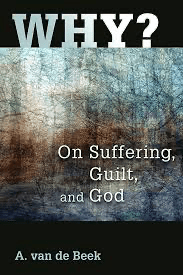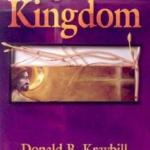Finally Finishing “Why?” Chapters 22 & 23
I apologize for letting this go so long. This is for you who have the book “Why? On Suffering, Guilt, and God” by A van de Beek (vdB).
Chapter 22 is “Participation with God.” There vdB embraces a somewhat relativist Christian ethic: “[n]o matter how far a given choice was beneath the standard of Jesus Christ, if there was no better choice, it was the correct choice.” (336) He ends with the claim that Christian ethics, with the Kingdom of God proclaimed by Jesus Christ as the sole norm (critical principle) “In the proclamation of Jesus Christ the church and the world are continually placed under criticism. Wherever the Word opens up people are confronted with the judgment over their lives. By the absolute norm of the kingdom the judgment is always negative; people always fall short. By the relative norm of the kingdom-in-progress-of-realization, it is an exhortation to examine oneself and one another to see if our deeds are deeds of the Spirit of Christ.” (338)
I agree with everything in this chapter. Insofar as we do what vdB says, though, we pastors and theologians will always be unpopular—with many people who want only to have their ears “tickled.” Criticism is rarely really appreciated.
Chapter 22 is entitled “A New Heaven and a New Earth.” VdB argues that we Christ followers should expect that, on the way to the kingdom, “our way too [like Christ’s] will pass through suffering.” (341) Also, “Essentially we [Christians] do not belong to this aeon but to the aeon of him who died to this present aeon. Where amidst the suffering of the world people are conscious of this relationship to Christ, there the longing for glorification grows all the more. The saints say, ‘How long, O Lord’?” (341)
I judge that the best paragraph in this whole book is on page 346: “[t]he resurrection of Christ is the resurrection of the crucified, of him who identified with prostitutes and publicans, Samaritans, sinners and pagans. In Christ’s resurrection God placed himself on the side of sinners and pagans. Consequently, his kingdom bears the stamp of the forgiveness of sins and the acceptance of all. The new existence is ruled by forgiven guilt and broken-down walls of separation. Hence, the kingdom of God is the realm of freedom in which people may live without fear. For anxiety is not only the awareness of finitude; it is also the awareness of guilt. However, where guilt has been removed people may live together as brothers and sisters.”
Yes, vdB rejects any absolute teaching of “apokatastasis”—together with Barth, but also together with Barth he affirms that Christ guarantees forgiveness to all who want it.
Many people who have been reading “Why?” Have told me there are claims in the book with which they cannot agree but also that there are gems of theology in the book that have made them think and that have comforted them and challenged them. That’s what good theology does.
I think the last two chapters of “Why?” Form a perfect launching point into “The Upside Down Kingdom” which is our next book for discussion here.
*Note: If you choose to comment, make sure it is relatively brief (no more than 100 words), on topic, addressed to me, civil and respectful (not hostile or argumentative), and devoid of pictures or links.*














